Analysis of Nursing Leadership and Professional Practice
VerifiedAdded on 2022/10/10
|12
|2903
|30
Essay
AI Summary
This essay delves into the critical aspects of nursing leadership and its impact on professional practice, using a case study involving a newly graduated nurse named Kim. The paper begins with an introduction to the importance of nursing leadership in healthcare, highlighting the role of nurse leaders in policy design, clinical practice guidance, and fostering a positive learning environment. The essay then explores the author's personality type based on an online test, followed by a SWOT analysis of the identified personality traits. The core of the essay revolves around Kim's experience in a cardiac arrest ward, where a lack of equipment knowledge led to a stressful situation. The essay analyzes this scenario through the lens of the RN standards of practice and the Gibbs model of reflection, providing a detailed account of the situation, feelings, evaluation, analysis, conclusions, and action plan. The essay also discusses the clinical leadership expectations for new graduate nurses, emphasizing the scope of practice, legal and ethical boundaries. Furthermore, the essay highlights the supportive elements in effective leadership, such as knowledge, evidence, communication, and networks, concluding with the significant role of nurse leaders in guiding student nurses and improving health outcomes.
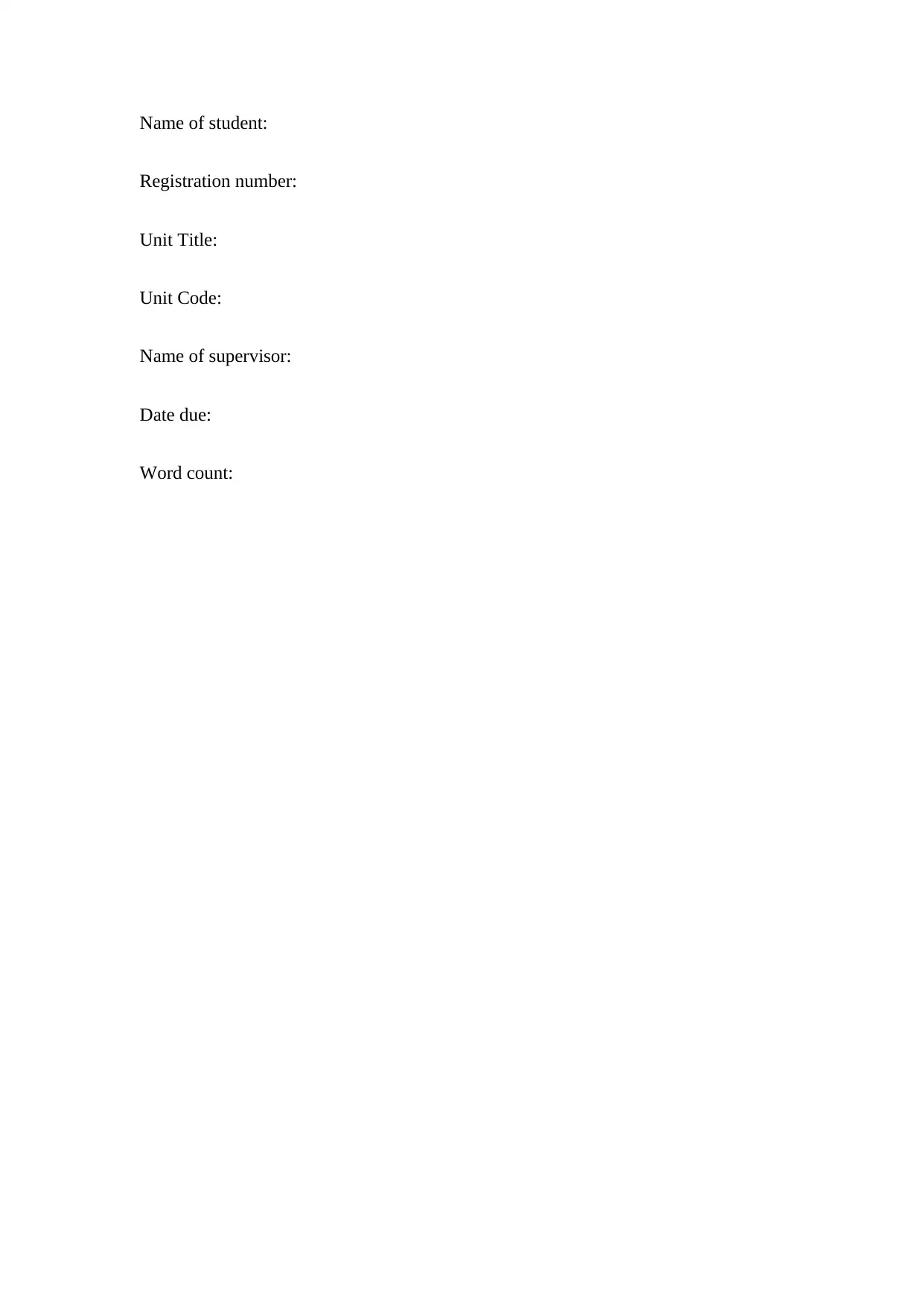
Name of student:
Registration number:
Unit Title:
Unit Code:
Name of supervisor:
Date due:
Word count:
Registration number:
Unit Title:
Unit Code:
Name of supervisor:
Date due:
Word count:
Paraphrase This Document
Need a fresh take? Get an instant paraphrase of this document with our AI Paraphraser
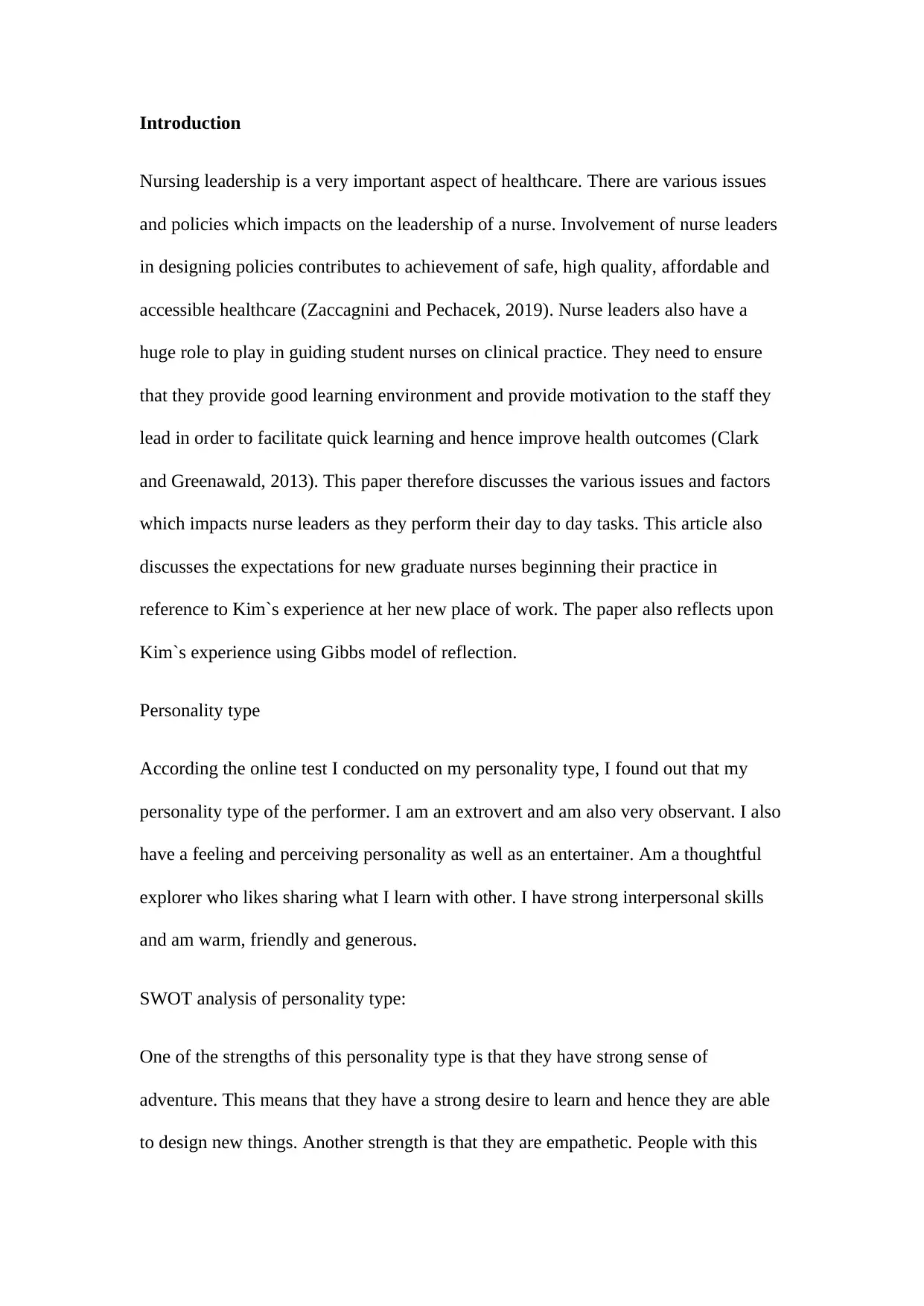
Introduction
Nursing leadership is a very important aspect of healthcare. There are various issues
and policies which impacts on the leadership of a nurse. Involvement of nurse leaders
in designing policies contributes to achievement of safe, high quality, affordable and
accessible healthcare (Zaccagnini and Pechacek, 2019). Nurse leaders also have a
huge role to play in guiding student nurses on clinical practice. They need to ensure
that they provide good learning environment and provide motivation to the staff they
lead in order to facilitate quick learning and hence improve health outcomes (Clark
and Greenawald, 2013). This paper therefore discusses the various issues and factors
which impacts nurse leaders as they perform their day to day tasks. This article also
discusses the expectations for new graduate nurses beginning their practice in
reference to Kim`s experience at her new place of work. The paper also reflects upon
Kim`s experience using Gibbs model of reflection.
Personality type
According the online test I conducted on my personality type, I found out that my
personality type of the performer. I am an extrovert and am also very observant. I also
have a feeling and perceiving personality as well as an entertainer. Am a thoughtful
explorer who likes sharing what I learn with other. I have strong interpersonal skills
and am warm, friendly and generous.
SWOT analysis of personality type:
One of the strengths of this personality type is that they have strong sense of
adventure. This means that they have a strong desire to learn and hence they are able
to design new things. Another strength is that they are empathetic. People with this
Nursing leadership is a very important aspect of healthcare. There are various issues
and policies which impacts on the leadership of a nurse. Involvement of nurse leaders
in designing policies contributes to achievement of safe, high quality, affordable and
accessible healthcare (Zaccagnini and Pechacek, 2019). Nurse leaders also have a
huge role to play in guiding student nurses on clinical practice. They need to ensure
that they provide good learning environment and provide motivation to the staff they
lead in order to facilitate quick learning and hence improve health outcomes (Clark
and Greenawald, 2013). This paper therefore discusses the various issues and factors
which impacts nurse leaders as they perform their day to day tasks. This article also
discusses the expectations for new graduate nurses beginning their practice in
reference to Kim`s experience at her new place of work. The paper also reflects upon
Kim`s experience using Gibbs model of reflection.
Personality type
According the online test I conducted on my personality type, I found out that my
personality type of the performer. I am an extrovert and am also very observant. I also
have a feeling and perceiving personality as well as an entertainer. Am a thoughtful
explorer who likes sharing what I learn with other. I have strong interpersonal skills
and am warm, friendly and generous.
SWOT analysis of personality type:
One of the strengths of this personality type is that they have strong sense of
adventure. This means that they have a strong desire to learn and hence they are able
to design new things. Another strength is that they are empathetic. People with this
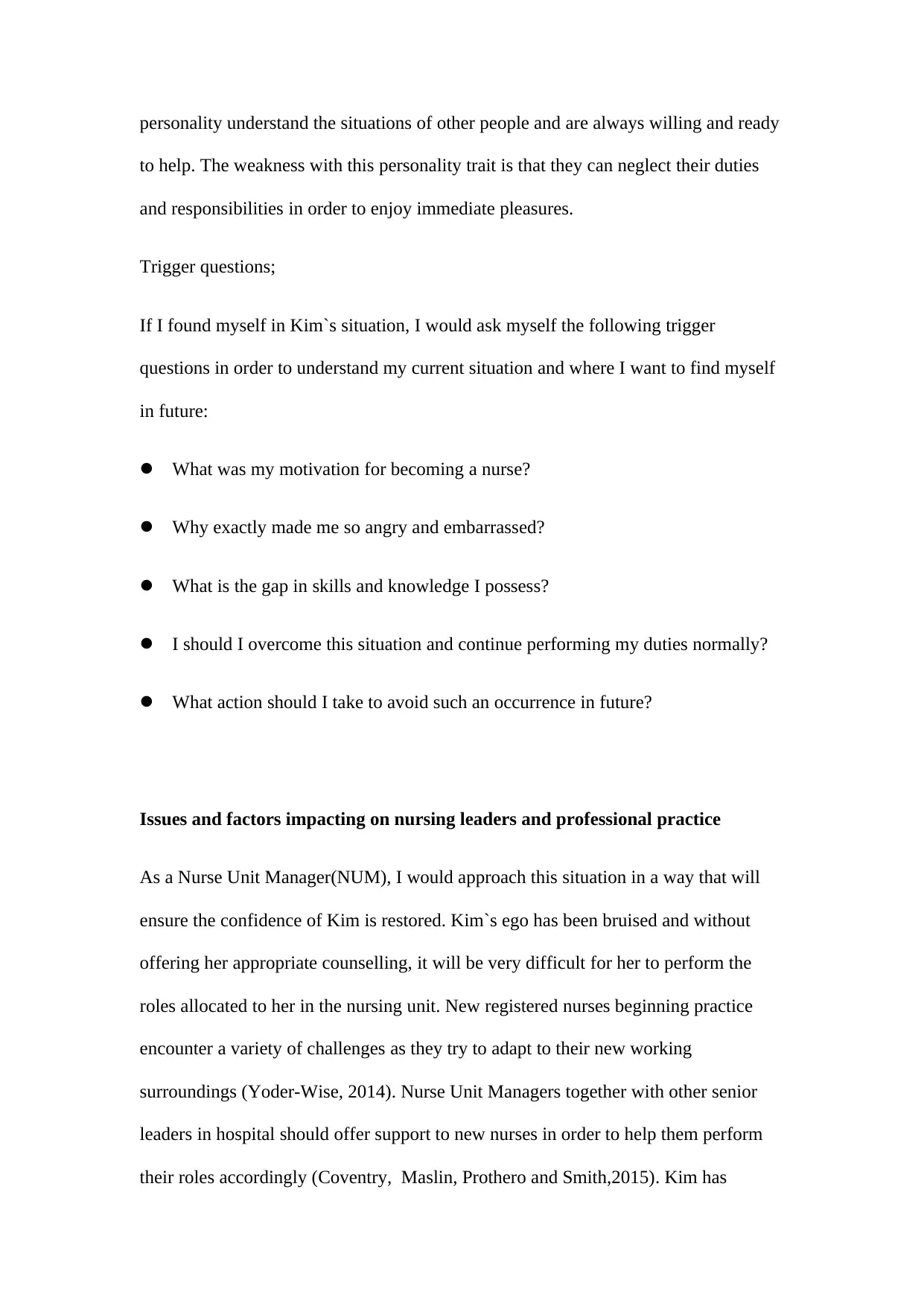
personality understand the situations of other people and are always willing and ready
to help. The weakness with this personality trait is that they can neglect their duties
and responsibilities in order to enjoy immediate pleasures.
Trigger questions;
If I found myself in Kim`s situation, I would ask myself the following trigger
questions in order to understand my current situation and where I want to find myself
in future:
What was my motivation for becoming a nurse?
Why exactly made me so angry and embarrassed?
What is the gap in skills and knowledge I possess?
I should I overcome this situation and continue performing my duties normally?
What action should I take to avoid such an occurrence in future?
Issues and factors impacting on nursing leaders and professional practice
As a Nurse Unit Manager(NUM), I would approach this situation in a way that will
ensure the confidence of Kim is restored. Kim`s ego has been bruised and without
offering her appropriate counselling, it will be very difficult for her to perform the
roles allocated to her in the nursing unit. New registered nurses beginning practice
encounter a variety of challenges as they try to adapt to their new working
surroundings (Yoder-Wise, 2014). Nurse Unit Managers together with other senior
leaders in hospital should offer support to new nurses in order to help them perform
their roles accordingly (Coventry, Maslin, Prothero and Smith,2015). Kim has
to help. The weakness with this personality trait is that they can neglect their duties
and responsibilities in order to enjoy immediate pleasures.
Trigger questions;
If I found myself in Kim`s situation, I would ask myself the following trigger
questions in order to understand my current situation and where I want to find myself
in future:
What was my motivation for becoming a nurse?
Why exactly made me so angry and embarrassed?
What is the gap in skills and knowledge I possess?
I should I overcome this situation and continue performing my duties normally?
What action should I take to avoid such an occurrence in future?
Issues and factors impacting on nursing leaders and professional practice
As a Nurse Unit Manager(NUM), I would approach this situation in a way that will
ensure the confidence of Kim is restored. Kim`s ego has been bruised and without
offering her appropriate counselling, it will be very difficult for her to perform the
roles allocated to her in the nursing unit. New registered nurses beginning practice
encounter a variety of challenges as they try to adapt to their new working
surroundings (Yoder-Wise, 2014). Nurse Unit Managers together with other senior
leaders in hospital should offer support to new nurses in order to help them perform
their roles accordingly (Coventry, Maslin, Prothero and Smith,2015). Kim has
⊘ This is a preview!⊘
Do you want full access?
Subscribe today to unlock all pages.

Trusted by 1+ million students worldwide
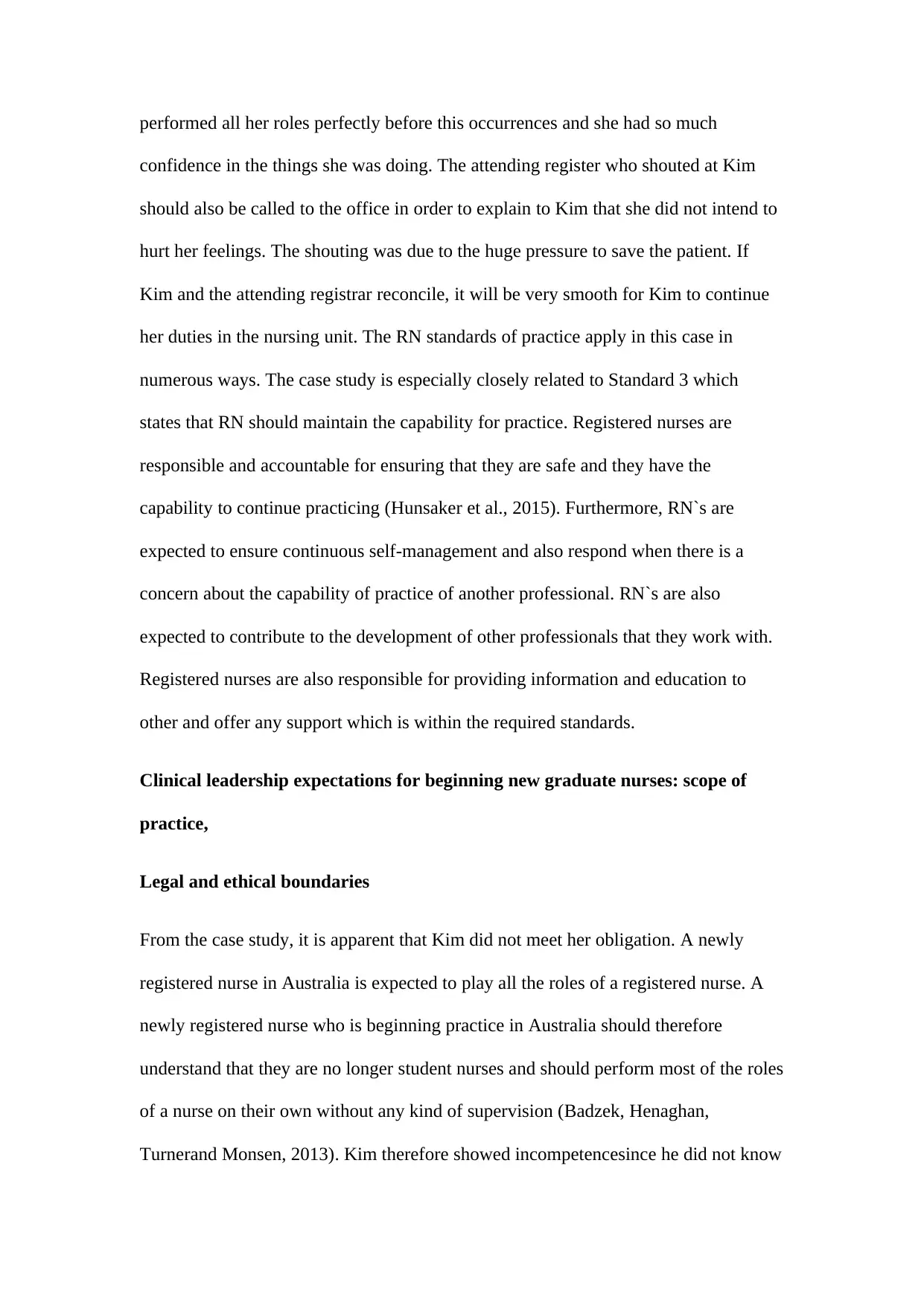
performed all her roles perfectly before this occurrences and she had so much
confidence in the things she was doing. The attending register who shouted at Kim
should also be called to the office in order to explain to Kim that she did not intend to
hurt her feelings. The shouting was due to the huge pressure to save the patient. If
Kim and the attending registrar reconcile, it will be very smooth for Kim to continue
her duties in the nursing unit. The RN standards of practice apply in this case in
numerous ways. The case study is especially closely related to Standard 3 which
states that RN should maintain the capability for practice. Registered nurses are
responsible and accountable for ensuring that they are safe and they have the
capability to continue practicing (Hunsaker et al., 2015). Furthermore, RN`s are
expected to ensure continuous self-management and also respond when there is a
concern about the capability of practice of another professional. RN`s are also
expected to contribute to the development of other professionals that they work with.
Registered nurses are also responsible for providing information and education to
other and offer any support which is within the required standards.
Clinical leadership expectations for beginning new graduate nurses: scope of
practice,
Legal and ethical boundaries
From the case study, it is apparent that Kim did not meet her obligation. A newly
registered nurse in Australia is expected to play all the roles of a registered nurse. A
newly registered nurse who is beginning practice in Australia should therefore
understand that they are no longer student nurses and should perform most of the roles
of a nurse on their own without any kind of supervision (Badzek, Henaghan,
Turnerand Monsen, 2013). Kim therefore showed incompetencesince he did not know
confidence in the things she was doing. The attending register who shouted at Kim
should also be called to the office in order to explain to Kim that she did not intend to
hurt her feelings. The shouting was due to the huge pressure to save the patient. If
Kim and the attending registrar reconcile, it will be very smooth for Kim to continue
her duties in the nursing unit. The RN standards of practice apply in this case in
numerous ways. The case study is especially closely related to Standard 3 which
states that RN should maintain the capability for practice. Registered nurses are
responsible and accountable for ensuring that they are safe and they have the
capability to continue practicing (Hunsaker et al., 2015). Furthermore, RN`s are
expected to ensure continuous self-management and also respond when there is a
concern about the capability of practice of another professional. RN`s are also
expected to contribute to the development of other professionals that they work with.
Registered nurses are also responsible for providing information and education to
other and offer any support which is within the required standards.
Clinical leadership expectations for beginning new graduate nurses: scope of
practice,
Legal and ethical boundaries
From the case study, it is apparent that Kim did not meet her obligation. A newly
registered nurse in Australia is expected to play all the roles of a registered nurse. A
newly registered nurse who is beginning practice in Australia should therefore
understand that they are no longer student nurses and should perform most of the roles
of a nurse on their own without any kind of supervision (Badzek, Henaghan,
Turnerand Monsen, 2013). Kim therefore showed incompetencesince he did not know
Paraphrase This Document
Need a fresh take? Get an instant paraphrase of this document with our AI Paraphraser
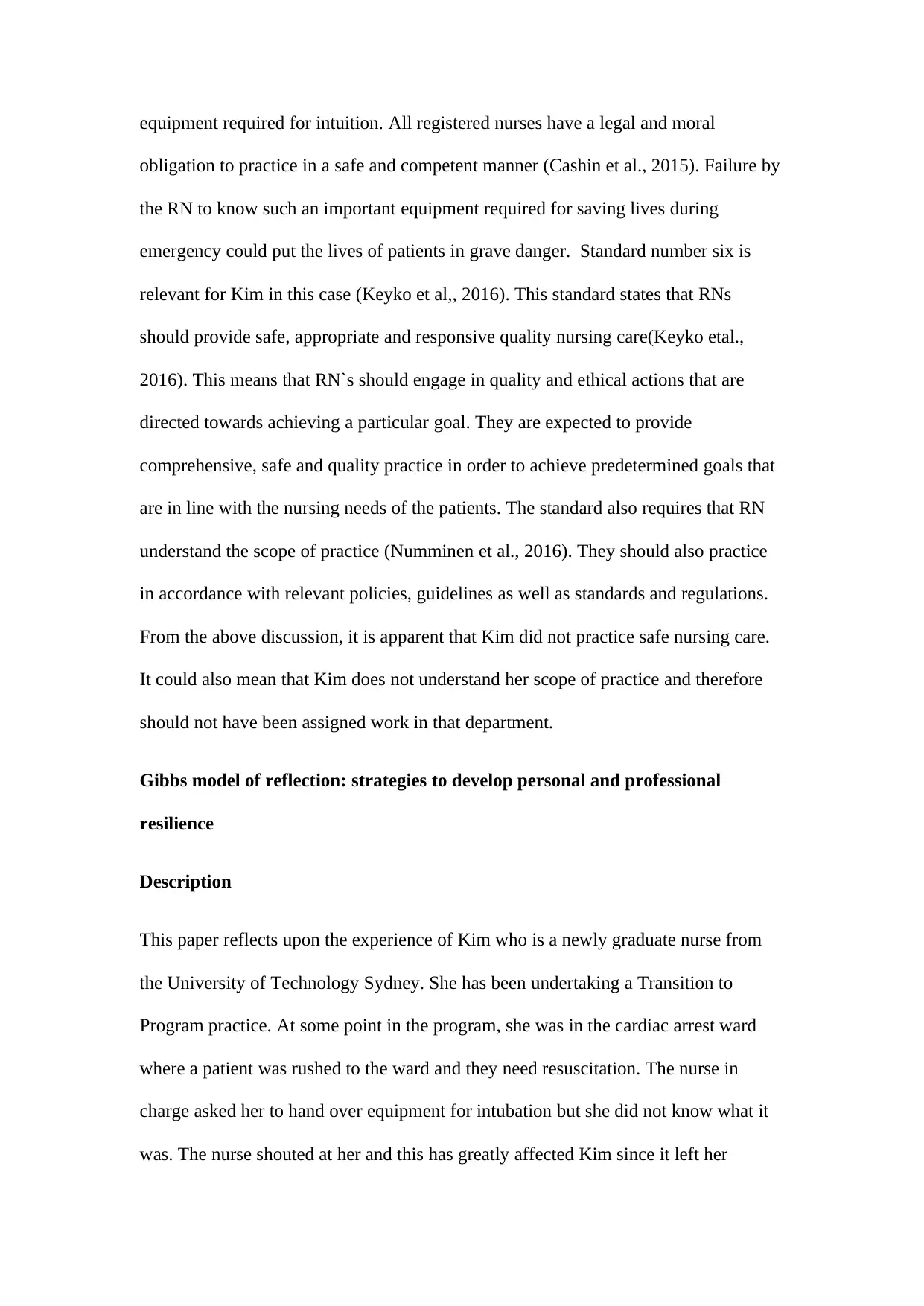
equipment required for intuition. All registered nurses have a legal and moral
obligation to practice in a safe and competent manner (Cashin et al., 2015). Failure by
the RN to know such an important equipment required for saving lives during
emergency could put the lives of patients in grave danger. Standard number six is
relevant for Kim in this case (Keyko et al,, 2016). This standard states that RNs
should provide safe, appropriate and responsive quality nursing care(Keyko etal.,
2016). This means that RN`s should engage in quality and ethical actions that are
directed towards achieving a particular goal. They are expected to provide
comprehensive, safe and quality practice in order to achieve predetermined goals that
are in line with the nursing needs of the patients. The standard also requires that RN
understand the scope of practice (Numminen et al., 2016). They should also practice
in accordance with relevant policies, guidelines as well as standards and regulations.
From the above discussion, it is apparent that Kim did not practice safe nursing care.
It could also mean that Kim does not understand her scope of practice and therefore
should not have been assigned work in that department.
Gibbs model of reflection: strategies to develop personal and professional
resilience
Description
This paper reflects upon the experience of Kim who is a newly graduate nurse from
the University of Technology Sydney. She has been undertaking a Transition to
Program practice. At some point in the program, she was in the cardiac arrest ward
where a patient was rushed to the ward and they need resuscitation. The nurse in
charge asked her to hand over equipment for intubation but she did not know what it
was. The nurse shouted at her and this has greatly affected Kim since it left her
obligation to practice in a safe and competent manner (Cashin et al., 2015). Failure by
the RN to know such an important equipment required for saving lives during
emergency could put the lives of patients in grave danger. Standard number six is
relevant for Kim in this case (Keyko et al,, 2016). This standard states that RNs
should provide safe, appropriate and responsive quality nursing care(Keyko etal.,
2016). This means that RN`s should engage in quality and ethical actions that are
directed towards achieving a particular goal. They are expected to provide
comprehensive, safe and quality practice in order to achieve predetermined goals that
are in line with the nursing needs of the patients. The standard also requires that RN
understand the scope of practice (Numminen et al., 2016). They should also practice
in accordance with relevant policies, guidelines as well as standards and regulations.
From the above discussion, it is apparent that Kim did not practice safe nursing care.
It could also mean that Kim does not understand her scope of practice and therefore
should not have been assigned work in that department.
Gibbs model of reflection: strategies to develop personal and professional
resilience
Description
This paper reflects upon the experience of Kim who is a newly graduate nurse from
the University of Technology Sydney. She has been undertaking a Transition to
Program practice. At some point in the program, she was in the cardiac arrest ward
where a patient was rushed to the ward and they need resuscitation. The nurse in
charge asked her to hand over equipment for intubation but she did not know what it
was. The nurse shouted at her and this has greatly affected Kim since it left her
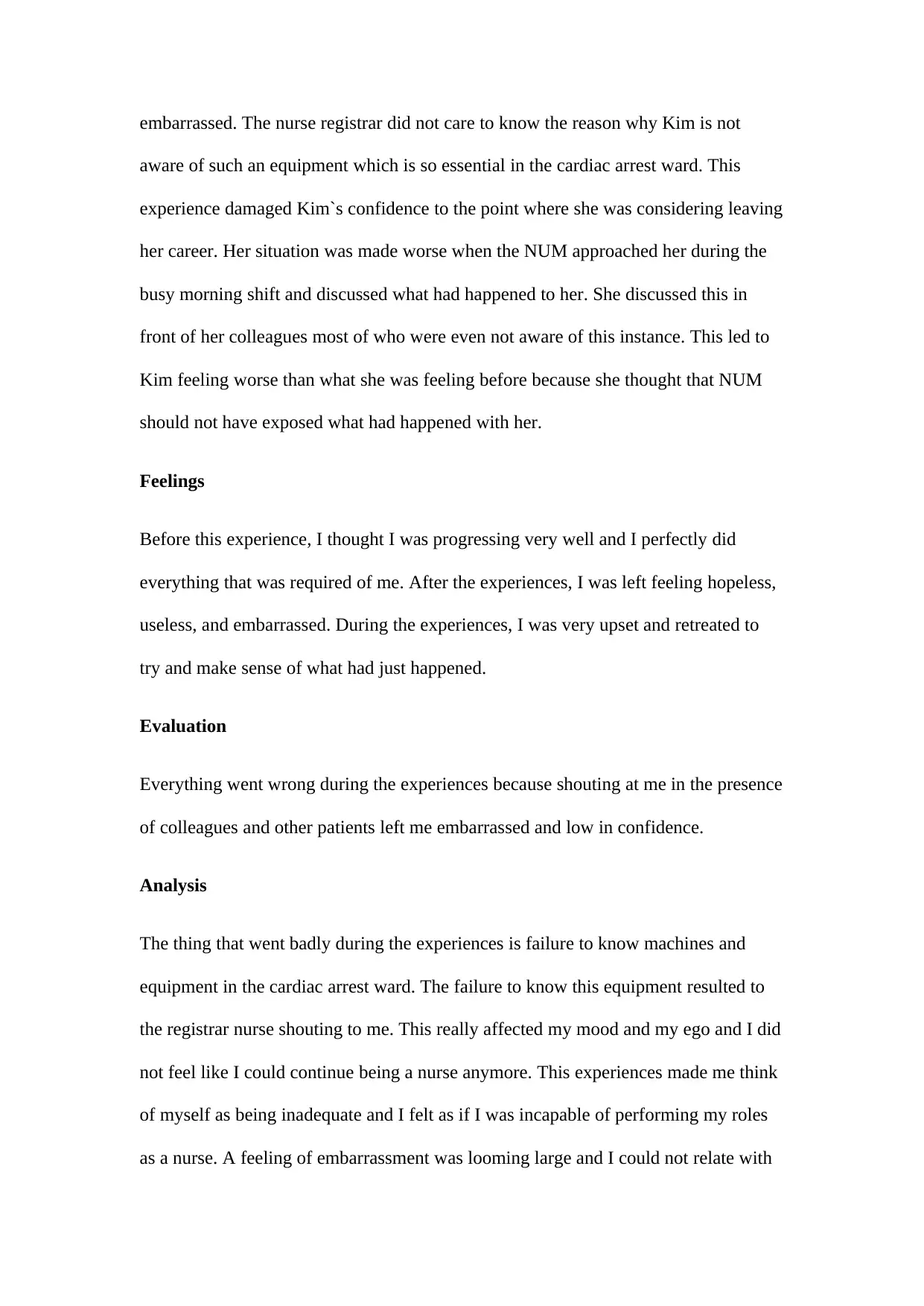
embarrassed. The nurse registrar did not care to know the reason why Kim is not
aware of such an equipment which is so essential in the cardiac arrest ward. This
experience damaged Kim`s confidence to the point where she was considering leaving
her career. Her situation was made worse when the NUM approached her during the
busy morning shift and discussed what had happened to her. She discussed this in
front of her colleagues most of who were even not aware of this instance. This led to
Kim feeling worse than what she was feeling before because she thought that NUM
should not have exposed what had happened with her.
Feelings
Before this experience, I thought I was progressing very well and I perfectly did
everything that was required of me. After the experiences, I was left feeling hopeless,
useless, and embarrassed. During the experiences, I was very upset and retreated to
try and make sense of what had just happened.
Evaluation
Everything went wrong during the experiences because shouting at me in the presence
of colleagues and other patients left me embarrassed and low in confidence.
Analysis
The thing that went badly during the experiences is failure to know machines and
equipment in the cardiac arrest ward. The failure to know this equipment resulted to
the registrar nurse shouting to me. This really affected my mood and my ego and I did
not feel like I could continue being a nurse anymore. This experiences made me think
of myself as being inadequate and I felt as if I was incapable of performing my roles
as a nurse. A feeling of embarrassment was looming large and I could not relate with
aware of such an equipment which is so essential in the cardiac arrest ward. This
experience damaged Kim`s confidence to the point where she was considering leaving
her career. Her situation was made worse when the NUM approached her during the
busy morning shift and discussed what had happened to her. She discussed this in
front of her colleagues most of who were even not aware of this instance. This led to
Kim feeling worse than what she was feeling before because she thought that NUM
should not have exposed what had happened with her.
Feelings
Before this experience, I thought I was progressing very well and I perfectly did
everything that was required of me. After the experiences, I was left feeling hopeless,
useless, and embarrassed. During the experiences, I was very upset and retreated to
try and make sense of what had just happened.
Evaluation
Everything went wrong during the experiences because shouting at me in the presence
of colleagues and other patients left me embarrassed and low in confidence.
Analysis
The thing that went badly during the experiences is failure to know machines and
equipment in the cardiac arrest ward. The failure to know this equipment resulted to
the registrar nurse shouting to me. This really affected my mood and my ego and I did
not feel like I could continue being a nurse anymore. This experiences made me think
of myself as being inadequate and I felt as if I was incapable of performing my roles
as a nurse. A feeling of embarrassment was looming large and I could not relate with
⊘ This is a preview!⊘
Do you want full access?
Subscribe today to unlock all pages.

Trusted by 1+ million students worldwide
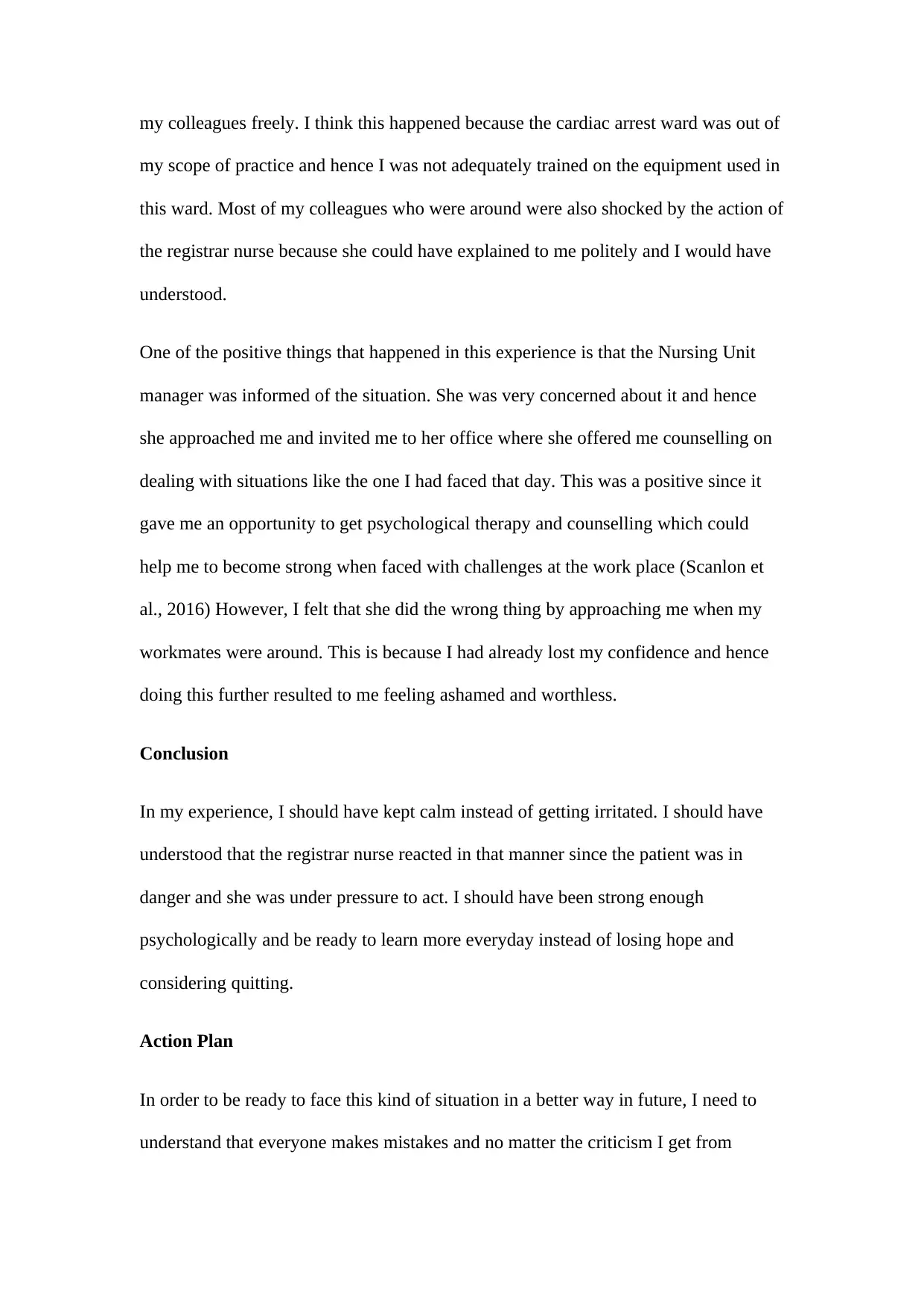
my colleagues freely. I think this happened because the cardiac arrest ward was out of
my scope of practice and hence I was not adequately trained on the equipment used in
this ward. Most of my colleagues who were around were also shocked by the action of
the registrar nurse because she could have explained to me politely and I would have
understood.
One of the positive things that happened in this experience is that the Nursing Unit
manager was informed of the situation. She was very concerned about it and hence
she approached me and invited me to her office where she offered me counselling on
dealing with situations like the one I had faced that day. This was a positive since it
gave me an opportunity to get psychological therapy and counselling which could
help me to become strong when faced with challenges at the work place (Scanlon et
al., 2016) However, I felt that she did the wrong thing by approaching me when my
workmates were around. This is because I had already lost my confidence and hence
doing this further resulted to me feeling ashamed and worthless.
Conclusion
In my experience, I should have kept calm instead of getting irritated. I should have
understood that the registrar nurse reacted in that manner since the patient was in
danger and she was under pressure to act. I should have been strong enough
psychologically and be ready to learn more everyday instead of losing hope and
considering quitting.
Action Plan
In order to be ready to face this kind of situation in a better way in future, I need to
understand that everyone makes mistakes and no matter the criticism I get from
my scope of practice and hence I was not adequately trained on the equipment used in
this ward. Most of my colleagues who were around were also shocked by the action of
the registrar nurse because she could have explained to me politely and I would have
understood.
One of the positive things that happened in this experience is that the Nursing Unit
manager was informed of the situation. She was very concerned about it and hence
she approached me and invited me to her office where she offered me counselling on
dealing with situations like the one I had faced that day. This was a positive since it
gave me an opportunity to get psychological therapy and counselling which could
help me to become strong when faced with challenges at the work place (Scanlon et
al., 2016) However, I felt that she did the wrong thing by approaching me when my
workmates were around. This is because I had already lost my confidence and hence
doing this further resulted to me feeling ashamed and worthless.
Conclusion
In my experience, I should have kept calm instead of getting irritated. I should have
understood that the registrar nurse reacted in that manner since the patient was in
danger and she was under pressure to act. I should have been strong enough
psychologically and be ready to learn more everyday instead of losing hope and
considering quitting.
Action Plan
In order to be ready to face this kind of situation in a better way in future, I need to
understand that everyone makes mistakes and no matter the criticism I get from
Paraphrase This Document
Need a fresh take? Get an instant paraphrase of this document with our AI Paraphraser
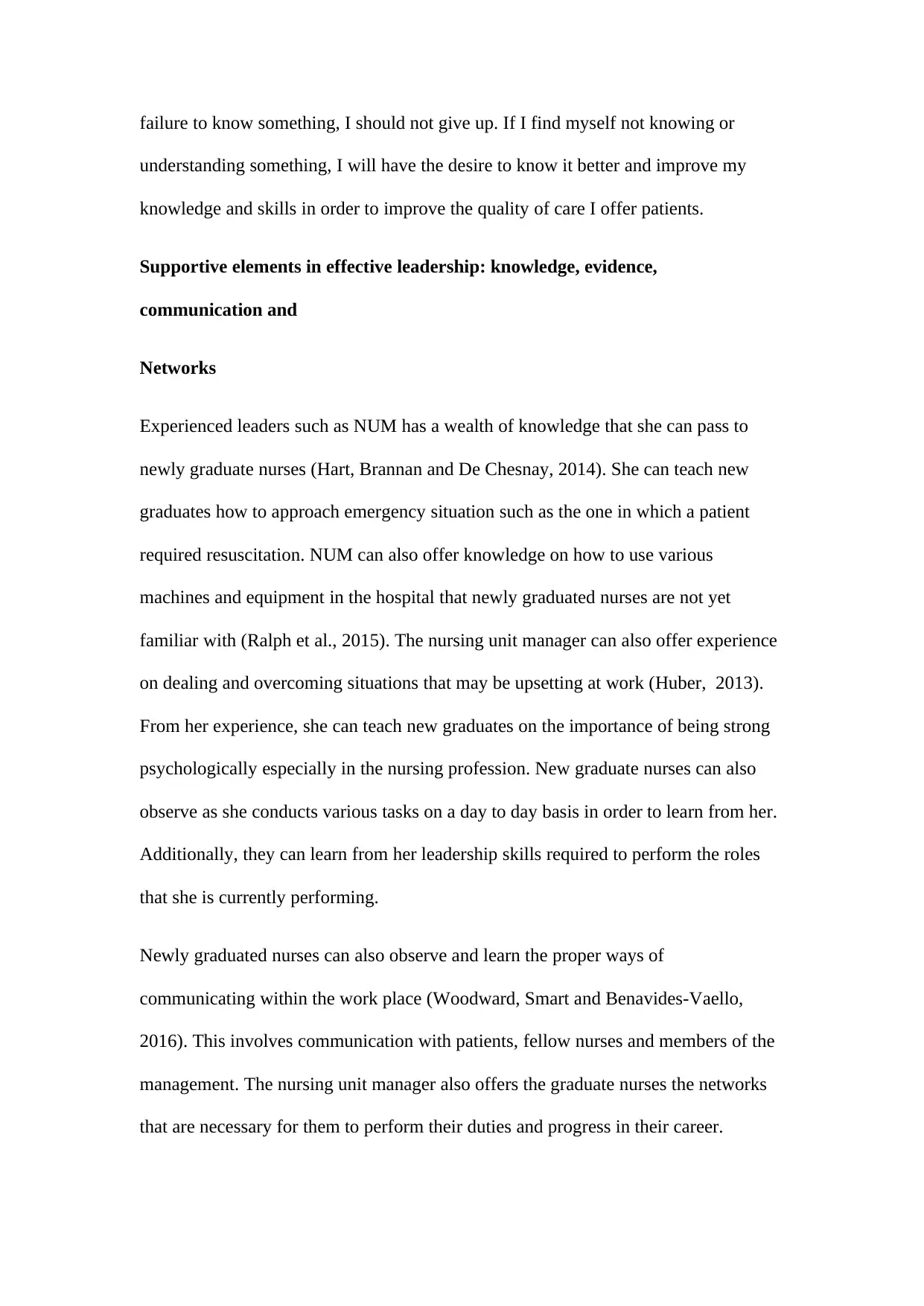
failure to know something, I should not give up. If I find myself not knowing or
understanding something, I will have the desire to know it better and improve my
knowledge and skills in order to improve the quality of care I offer patients.
Supportive elements in effective leadership: knowledge, evidence,
communication and
Networks
Experienced leaders such as NUM has a wealth of knowledge that she can pass to
newly graduate nurses (Hart, Brannan and De Chesnay, 2014). She can teach new
graduates how to approach emergency situation such as the one in which a patient
required resuscitation. NUM can also offer knowledge on how to use various
machines and equipment in the hospital that newly graduated nurses are not yet
familiar with (Ralph et al., 2015). The nursing unit manager can also offer experience
on dealing and overcoming situations that may be upsetting at work (Huber, 2013).
From her experience, she can teach new graduates on the importance of being strong
psychologically especially in the nursing profession. New graduate nurses can also
observe as she conducts various tasks on a day to day basis in order to learn from her.
Additionally, they can learn from her leadership skills required to perform the roles
that she is currently performing.
Newly graduated nurses can also observe and learn the proper ways of
communicating within the work place (Woodward, Smart and Benavides-Vaello,
2016). This involves communication with patients, fellow nurses and members of the
management. The nursing unit manager also offers the graduate nurses the networks
that are necessary for them to perform their duties and progress in their career.
understanding something, I will have the desire to know it better and improve my
knowledge and skills in order to improve the quality of care I offer patients.
Supportive elements in effective leadership: knowledge, evidence,
communication and
Networks
Experienced leaders such as NUM has a wealth of knowledge that she can pass to
newly graduate nurses (Hart, Brannan and De Chesnay, 2014). She can teach new
graduates how to approach emergency situation such as the one in which a patient
required resuscitation. NUM can also offer knowledge on how to use various
machines and equipment in the hospital that newly graduated nurses are not yet
familiar with (Ralph et al., 2015). The nursing unit manager can also offer experience
on dealing and overcoming situations that may be upsetting at work (Huber, 2013).
From her experience, she can teach new graduates on the importance of being strong
psychologically especially in the nursing profession. New graduate nurses can also
observe as she conducts various tasks on a day to day basis in order to learn from her.
Additionally, they can learn from her leadership skills required to perform the roles
that she is currently performing.
Newly graduated nurses can also observe and learn the proper ways of
communicating within the work place (Woodward, Smart and Benavides-Vaello,
2016). This involves communication with patients, fellow nurses and members of the
management. The nursing unit manager also offers the graduate nurses the networks
that are necessary for them to perform their duties and progress in their career.
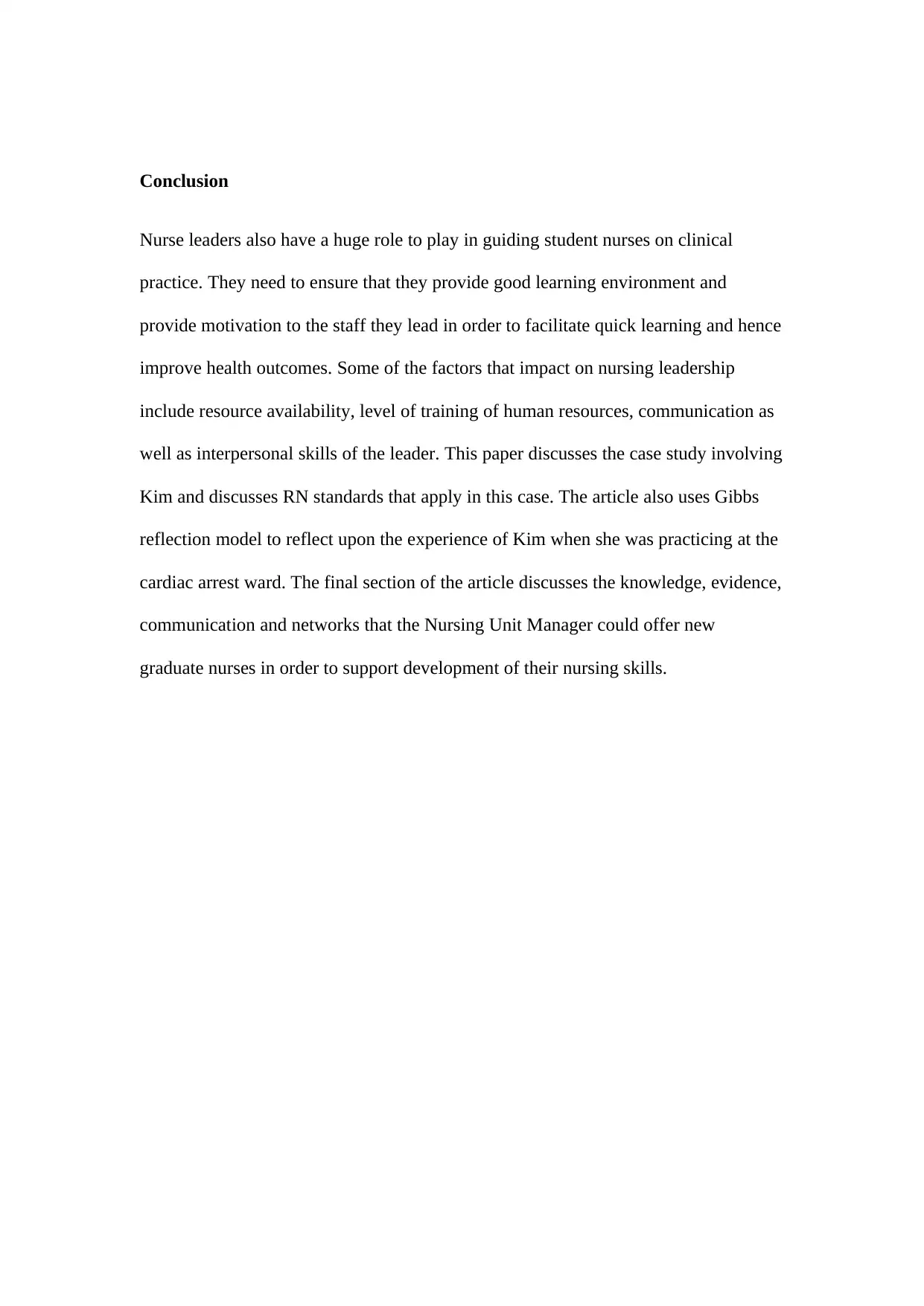
Conclusion
Nurse leaders also have a huge role to play in guiding student nurses on clinical
practice. They need to ensure that they provide good learning environment and
provide motivation to the staff they lead in order to facilitate quick learning and hence
improve health outcomes. Some of the factors that impact on nursing leadership
include resource availability, level of training of human resources, communication as
well as interpersonal skills of the leader. This paper discusses the case study involving
Kim and discusses RN standards that apply in this case. The article also uses Gibbs
reflection model to reflect upon the experience of Kim when she was practicing at the
cardiac arrest ward. The final section of the article discusses the knowledge, evidence,
communication and networks that the Nursing Unit Manager could offer new
graduate nurses in order to support development of their nursing skills.
Nurse leaders also have a huge role to play in guiding student nurses on clinical
practice. They need to ensure that they provide good learning environment and
provide motivation to the staff they lead in order to facilitate quick learning and hence
improve health outcomes. Some of the factors that impact on nursing leadership
include resource availability, level of training of human resources, communication as
well as interpersonal skills of the leader. This paper discusses the case study involving
Kim and discusses RN standards that apply in this case. The article also uses Gibbs
reflection model to reflect upon the experience of Kim when she was practicing at the
cardiac arrest ward. The final section of the article discusses the knowledge, evidence,
communication and networks that the Nursing Unit Manager could offer new
graduate nurses in order to support development of their nursing skills.
⊘ This is a preview!⊘
Do you want full access?
Subscribe today to unlock all pages.

Trusted by 1+ million students worldwide
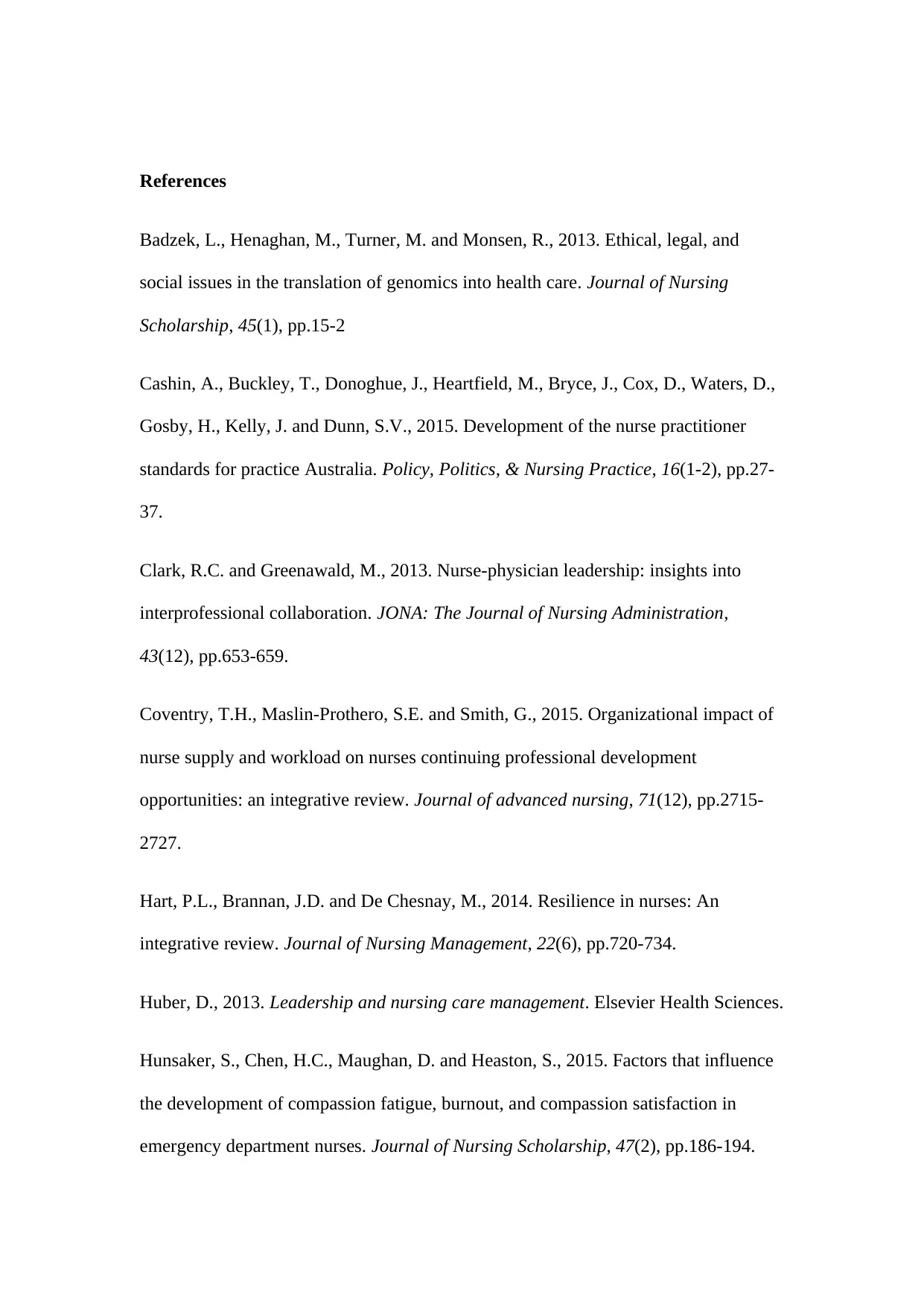
References
Badzek, L., Henaghan, M., Turner, M. and Monsen, R., 2013. Ethical, legal, and
social issues in the translation of genomics into health care. Journal of Nursing
Scholarship, 45(1), pp.15-2
Cashin, A., Buckley, T., Donoghue, J., Heartfield, M., Bryce, J., Cox, D., Waters, D.,
Gosby, H., Kelly, J. and Dunn, S.V., 2015. Development of the nurse practitioner
standards for practice Australia. Policy, Politics, & Nursing Practice, 16(1-2), pp.27-
37.
Clark, R.C. and Greenawald, M., 2013. Nurse-physician leadership: insights into
interprofessional collaboration. JONA: The Journal of Nursing Administration,
43(12), pp.653-659.
Coventry, T.H., Maslin‐Prothero, S.E. and Smith, G., 2015. Organizational impact of
nurse supply and workload on nurses continuing professional development
opportunities: an integrative review. Journal of advanced nursing, 71(12), pp.2715-
2727.
Hart, P.L., Brannan, J.D. and De Chesnay, M., 2014. Resilience in nurses: An
integrative review. Journal of Nursing Management, 22(6), pp.720-734.
Huber, D., 2013. Leadership and nursing care management. Elsevier Health Sciences.
Hunsaker, S., Chen, H.C., Maughan, D. and Heaston, S., 2015. Factors that influence
the development of compassion fatigue, burnout, and compassion satisfaction in
emergency department nurses. Journal of Nursing Scholarship, 47(2), pp.186-194.
Badzek, L., Henaghan, M., Turner, M. and Monsen, R., 2013. Ethical, legal, and
social issues in the translation of genomics into health care. Journal of Nursing
Scholarship, 45(1), pp.15-2
Cashin, A., Buckley, T., Donoghue, J., Heartfield, M., Bryce, J., Cox, D., Waters, D.,
Gosby, H., Kelly, J. and Dunn, S.V., 2015. Development of the nurse practitioner
standards for practice Australia. Policy, Politics, & Nursing Practice, 16(1-2), pp.27-
37.
Clark, R.C. and Greenawald, M., 2013. Nurse-physician leadership: insights into
interprofessional collaboration. JONA: The Journal of Nursing Administration,
43(12), pp.653-659.
Coventry, T.H., Maslin‐Prothero, S.E. and Smith, G., 2015. Organizational impact of
nurse supply and workload on nurses continuing professional development
opportunities: an integrative review. Journal of advanced nursing, 71(12), pp.2715-
2727.
Hart, P.L., Brannan, J.D. and De Chesnay, M., 2014. Resilience in nurses: An
integrative review. Journal of Nursing Management, 22(6), pp.720-734.
Huber, D., 2013. Leadership and nursing care management. Elsevier Health Sciences.
Hunsaker, S., Chen, H.C., Maughan, D. and Heaston, S., 2015. Factors that influence
the development of compassion fatigue, burnout, and compassion satisfaction in
emergency department nurses. Journal of Nursing Scholarship, 47(2), pp.186-194.
Paraphrase This Document
Need a fresh take? Get an instant paraphrase of this document with our AI Paraphraser
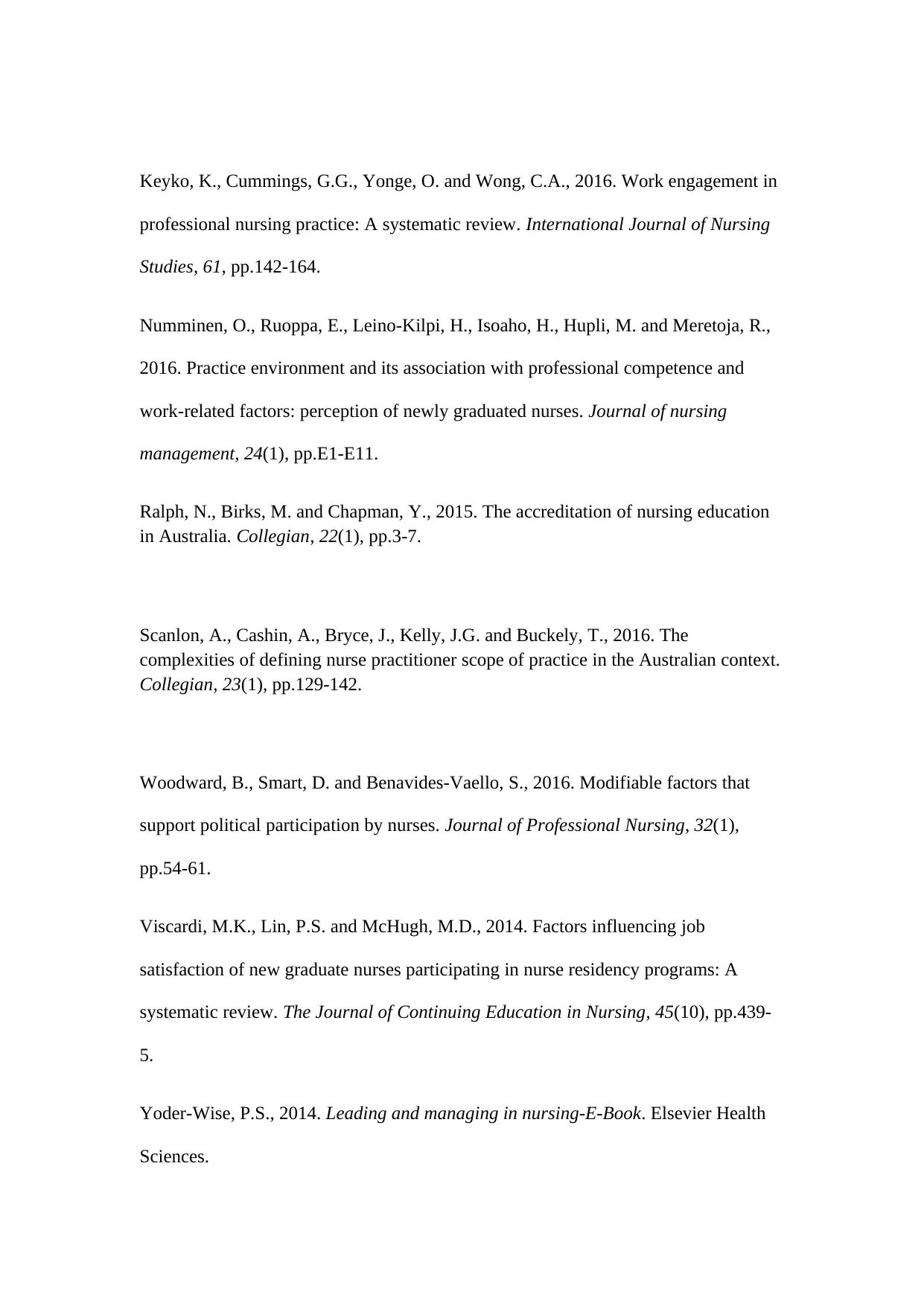
Keyko, K., Cummings, G.G., Yonge, O. and Wong, C.A., 2016. Work engagement in
professional nursing practice: A systematic review. International Journal of Nursing
Studies, 61, pp.142-164.
Numminen, O., Ruoppa, E., Leino‐Kilpi, H., Isoaho, H., Hupli, M. and Meretoja, R.,
2016. Practice environment and its association with professional competence and
work‐related factors: perception of newly graduated nurses. Journal of nursing
management, 24(1), pp.E1-E11.
Ralph, N., Birks, M. and Chapman, Y., 2015. The accreditation of nursing education
in Australia. Collegian, 22(1), pp.3-7.
Scanlon, A., Cashin, A., Bryce, J., Kelly, J.G. and Buckely, T., 2016. The
complexities of defining nurse practitioner scope of practice in the Australian context.
Collegian, 23(1), pp.129-142.
Woodward, B., Smart, D. and Benavides-Vaello, S., 2016. Modifiable factors that
support political participation by nurses. Journal of Professional Nursing, 32(1),
pp.54-61.
Viscardi, M.K., Lin, P.S. and McHugh, M.D., 2014. Factors influencing job
satisfaction of new graduate nurses participating in nurse residency programs: A
systematic review. The Journal of Continuing Education in Nursing, 45(10), pp.439-
5.
Yoder-Wise, P.S., 2014. Leading and managing in nursing-E-Book. Elsevier Health
Sciences.
professional nursing practice: A systematic review. International Journal of Nursing
Studies, 61, pp.142-164.
Numminen, O., Ruoppa, E., Leino‐Kilpi, H., Isoaho, H., Hupli, M. and Meretoja, R.,
2016. Practice environment and its association with professional competence and
work‐related factors: perception of newly graduated nurses. Journal of nursing
management, 24(1), pp.E1-E11.
Ralph, N., Birks, M. and Chapman, Y., 2015. The accreditation of nursing education
in Australia. Collegian, 22(1), pp.3-7.
Scanlon, A., Cashin, A., Bryce, J., Kelly, J.G. and Buckely, T., 2016. The
complexities of defining nurse practitioner scope of practice in the Australian context.
Collegian, 23(1), pp.129-142.
Woodward, B., Smart, D. and Benavides-Vaello, S., 2016. Modifiable factors that
support political participation by nurses. Journal of Professional Nursing, 32(1),
pp.54-61.
Viscardi, M.K., Lin, P.S. and McHugh, M.D., 2014. Factors influencing job
satisfaction of new graduate nurses participating in nurse residency programs: A
systematic review. The Journal of Continuing Education in Nursing, 45(10), pp.439-
5.
Yoder-Wise, P.S., 2014. Leading and managing in nursing-E-Book. Elsevier Health
Sciences.
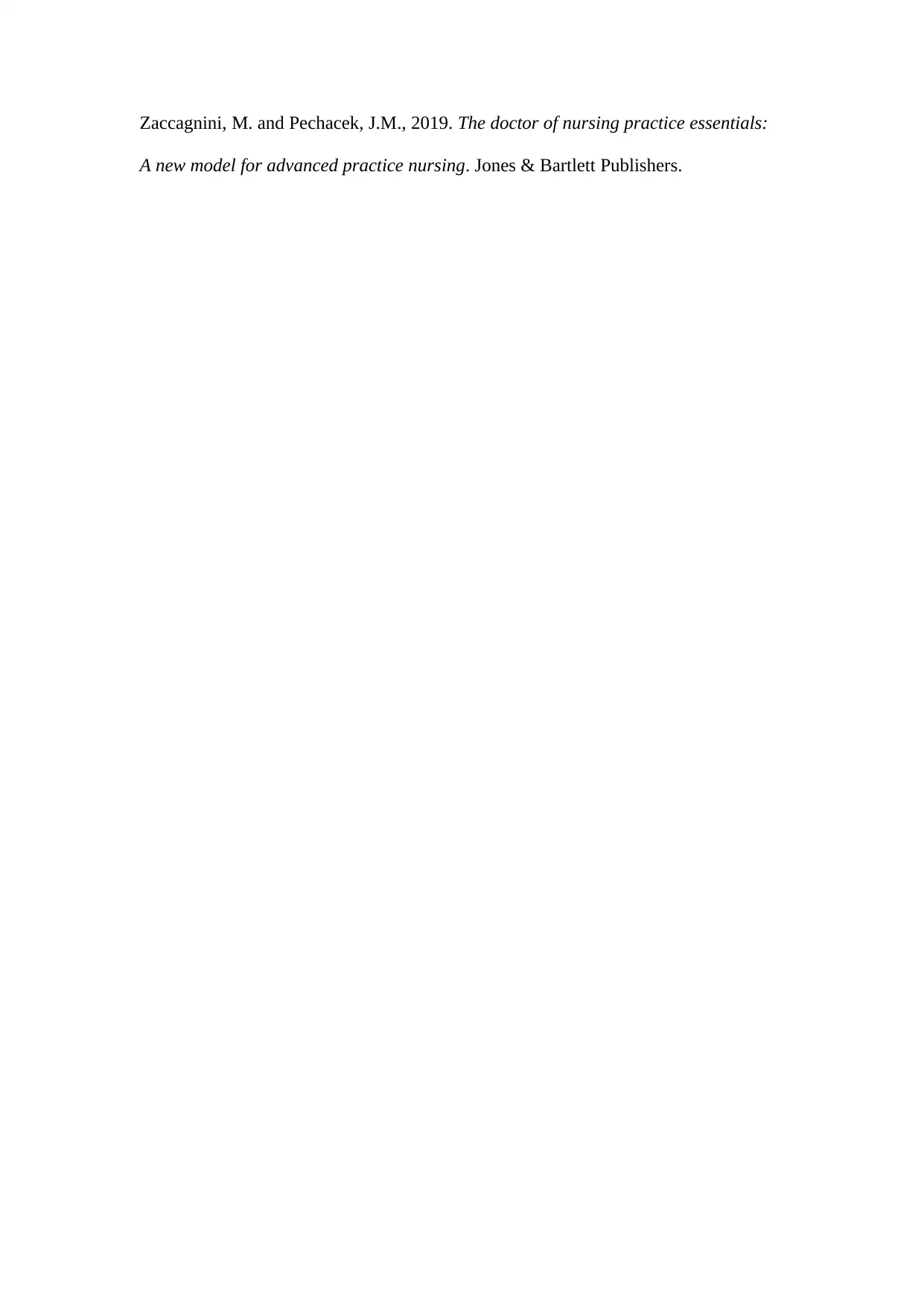
Zaccagnini, M. and Pechacek, J.M., 2019. The doctor of nursing practice essentials:
A new model for advanced practice nursing. Jones & Bartlett Publishers.
A new model for advanced practice nursing. Jones & Bartlett Publishers.
⊘ This is a preview!⊘
Do you want full access?
Subscribe today to unlock all pages.

Trusted by 1+ million students worldwide
1 out of 12
Related Documents
Your All-in-One AI-Powered Toolkit for Academic Success.
+13062052269
info@desklib.com
Available 24*7 on WhatsApp / Email
![[object Object]](/_next/static/media/star-bottom.7253800d.svg)
Unlock your academic potential
Copyright © 2020–2025 A2Z Services. All Rights Reserved. Developed and managed by ZUCOL.





